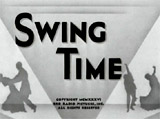
|
Swing
Time (1936)
In director George Stevens' superb romantic musical
(a song-and-dance film) made during the height of the Depression
Era - noted for the magical dancing rapport between Fred Astaire
and Ginger Rogers (their 6th film overall, and their 6th of 9 films
for RKO in the 1930s):
- young professional hoofer-dancer,
bandleader, aspiring gambler, and groom-to-be John
"Lucky" Garnett (Fred Astaire) was engaged to his long-time
wealthy girlfriend Margaret Watson (Betty Furness); he was
delayed (actually sabotaged by his dance team who wanted him to remain
single and in show-biz) in getting to his hometown wedding on time,
due to being convinced that his outdated groom's outfit
needed tailoring; due to his very late tardiness, Judge Watson
(Landers Stevens), his fiancee's angry father, had already called
off the marriage ceremony to be held at his home
- Judge Watson (and Margaret) gave "Lucky" a second
chance by challenging him to earn at least $25,000 in the big
city of NY to prove his worthiness, and that he could support Margaret
as his wife
- the penniless "Lucky" (who was broke except for
a lucky quarter after losing a bet about getting married) was
joined by his aging faithful sidekick-friend Dr. Everett "Pop" Cardetti
(Victor Moore) on a freight train to NYC, to somehow earn the
money
- on the street, "Lucky" met pretty platinum-blonde
dancer Penelope "Penny" Carroll
(Ginger Rogers) when he asked her for change for his quarter to buy
cigarettes from a vending machine; afterwards, "Lucky" followed
her to her place of employment - she was a dance instructor at
the Gordon Dancing Academy
- inside her studio in a light courtship "Pick Yourself
Up" sequence, "Lucky" was offered a free trial dance lesson; he
posed as an uncoordinated pupil, faking ignorance and predending
to be a klutz; "Penny" was quickly frustrated by his awkwardness,
especially when he caused both of them to collapse to the floor after trying a simple dance
step; frustrated by his hopeless dancing, she huffed at him: "I
can't teach you anything...No one could teach you to dance in a
million years!"; she also told him
to "save his money" on dance lessons, thereby insulting "Lucky"
in the presence of the Academy's over-solicitous owner Mr. Gordon
(Eric Blore), who overheard Penny's harsh words and promptly
fired her
- to save Penny's job, "Lucky"
defended her ("She's the most wonderful little teacher I've ever
heard of") and saved her job by demonstrating what he had really
just been "taught"; again to the tune of "Pick Yourself Up," he performed
an intricate and playful duet on the circular, bare practice dance
floor
- Penny's employment was restored, and Mr. Gordon
was so impressed that he made an appointment for them with owner
Mr. Al Simpson (Pierre Watkin) to tryout as performers at his swanky
Silver Sandal night club; Lucky attempted to
use his gambling skills (in a game of strip piquet) to win a suit
of evening clothes for the audition; however, they missed the audition,
causing another rift between them
- a week later, after "Pop" and "Lucky" had picketed
in the hall outside of "Penny's" hotel apartment (where she
lived with her older single friend Mabel Anderson (Helen Broderick),
the Academy's fired receptionist), "Penny" was still stubborn;
Mabel let "Lucky" in while Penny was shampooing her hair in the
next room; he sat down at a piano and serenaded Penny with
the lyrical, romantic, melancholy, Oscar-winning ballad: "The
Way You Look Tonight" - (also reprised later) an exaltation
of her charming beauty; Penny finally
gave in and agreed to forgive "Lucky"; in the meantime, "Lucky"
had successfully won hundreds of dollars gambling, and had arranged
for a second audition at the nightclub
- during their attempt at a second club audition,
detestable tenor bandleader Ricardo "Ricky" Romero
(Georges Metaxa), who was in love with Penny and wished to marry
her, jealousy refused to play for them; Mr. Simpson wouldn't back
their request to have Romero play, because he had gambled away
his musician to a rival nightclub/gambling casino owner, Dice Raymond
(John Harrington)
- at Raymond's club where Romero was the new bandleader,
"Lucky" was able to win "Ricky's" contract (with Pop's help during
a game of cards), and was then reluctantly
convinced to accompany them with music [for
their audition?] by publicly announcing the start of the lovely "Waltz
in Swing Time"; in a spotlight, Penny and "Lucky" performed in a
spotlight on the dance floor of the mirror-shiny Art Deco nightclub;
she was wearing a light colored evening dress while he was formally
attired in a tuxedo - the audition appeared to be a success and Penny
and Lucky were falling in love
- a dilemma then arose for "Lucky" - how could he
face his engaged fiancee back in his hometown and his pledge to
her, especially after his gambling winnings?; he deliberately did
everything he could to avoid earning money, became nervous around
"Penny," acted aloof to her, and avoided being alone with her
- Mabel arranged for the two of them to be together
during a trip to the countryside - a snowy winter wonderland sequence;
in a snow-covered gazebo, "Lucky" and Penny" were again tempted
to flirt with each other - but Penny realized
he was holding back and complained by singing the bitter, accusatory,
sarcastic song "A Fine Romance" (also
reprised at film's end)
- while Lucky was distracted, Pop inexplicably told
Penny about Lucky's engagement: "...if
Lucky gets $25,000 ahead, he has to go back and marry that girl...the
girl he's engaged to." The news was a heavy, hurtful blow
to Penny
- back at the remodeled Silver Sandal nightclub, Penny
expressed her unhappiness and disinterest in Lucky, although Mabel
encouraged her to find the "nerve" to surprise Lucky with a kiss; she
coyly kissed "Lucky" behind his dressing room door
- Lucky was called to dance a black-faced tribute
to dancer Bill 'Bojangles' Robinson with "Bojangles of Harlem" (Astaire's
first and last blackface performance) in which he danced with a
chorus line and then tap-danced along with three huge silhouette-shadows;
at the end of his dance when Lucky took his curtain call in front
of the audience, he was startled to notice Margaret Watson, his
fiancee, seated there
- due to further misunderstandings regarding Lucky's
return to gambling, and Penny's disturbed reaction to Margaret's
presence, Penny accepted Romero's offer
of marriage and was wearing his engagement ring; Lucky's and Penny's
romantic fortunes and future seemed dashed; as the estranged couple
spoke to each other on the deserted and quiet dance floor of the
Silver Sandal nightclub, Lucky told Penny: "I've
danced with you. I'm never gonna dance again" -
and then sang "Never Gonna Dance" to appeal to her as
she stood on a staircase slightly above him - he told her of his
broken heart and frustration, and how forlorn, pained and sad he
would be without her; the song transitioned to
their stunning dance number
"Never Gonna Dance" - the film's song and dance highlight
- in the final sequence in the film, all loose ends
were tied and the two protagonists were re-united, as expected; both
of them were able to escape their prior marital engagements or entanglements;
Margaret admitted to Lucky, first in a written note and then in words,
that she wasn't in love with him after all ("I can't marry you")
and wanted to marry another hometown suitor; Lucky also confessed
his love for someone else; however, Penny was
still planning on marrying Romero in the afternoon, but then she also
called off her wedding to "Ricky"
- as the film ended, Lucky serenaded Penny with a
bit of her song "A Fine Romance," and she counterpointed him with his song "The
Way You Look Tonight," as they both overlooked a snowy scene
above Central Park through a picture window
|
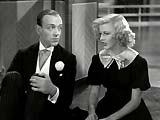
"Pick Yourself Up"
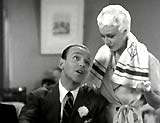
"The Way You Look Tonight"
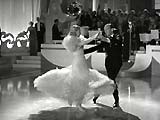
"Waltz in Swing Time"
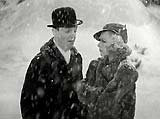
"A Fine Romance"
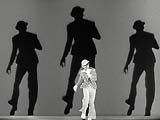
"Bojangles of Harlem"



"Never Gonna Dance"
|









